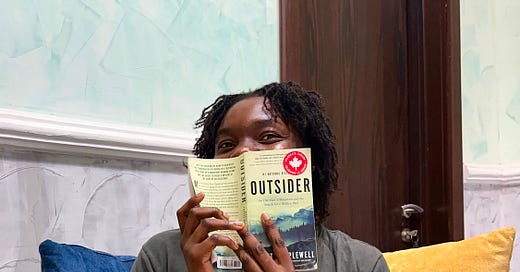When I started reading this, I was positively intrigued. This “elderly man” who somehow defied his age seemed so fascinating. How could he do all these and keep his body going at this age? I couldn’t imagine it.
As I read along, I became less fascinated. His life was empty, no matter how extraordinary it was that he was so physically fit. Pushing himself past his boundaries was a way to hide that emptiness. Consistently running and on the move all pointed to his emptiness.
Dag was a troubled man. The writer of this book said something about him being damaged but not broken; I can’t remember exactly how he wrote it. I think Dag never really dealt with the difficulties of his childhood, and this played into how he lived his life.
He had no attachments to anything or anybody, which had much to do with his upbringing and his relationship with his parents. It’s funny how this guy who was so physically fit could down eight beers in one night. He would consistently push past his limits and injure himself countless times with no allowance for recovery.
Did he truly cherish his body? I get his somewhat carefree life, but all it truly revealed is a troubled man. I admire his ability to push past many things, to move forward, and not dwell too much on the past.
We often think that if we can get past the now, it’s all better ahead. The thing is, the past comes chasing us down when we don’t deal with it properly. We think that when we tuck away the past, it stays tucked away. That’s not what happens; it spills over and refuses to stay tucked away.
Dag made the most of his life; his adopted parents did not make it any easier for him, but I think he could have had a much fuller life if he had dealt with how those events of his childhood shaped him. This obviously is based on my own definition of a full life.
We experience many things that are beyond our control. It’s easy to say, "I’m just this way." But a point must come when we face them, when we define for ourselves what our lives must be.
Dag probably did that. Maybe I’m struggling to see that as good because I would have done it differently.
He came to accept his life, and once he accepted it, he saw no reason to change it. There was more than enough time for him to at least repair his relationship with his children, but he didn’t. Perhaps he was truly content with having little to no relationship with them.
Change is often hard. To repair his relationship with his children would have been to change his way of life. To him, that was too much to give up. He had grandchildren he didn’t know, a son who probably never knew he existed.
His alcoholism led to the end of the marriage; he squandered all his inheritance and was spending his wife’s money on alcohol while being jobless until she could take it no more. He was once a man who had a good relationship with his kids, who changed their diapers, took them skiing, to the beach, and on walks in nature.
It’s hard to ignore the fact that his mother’s death and looking into the details of his biological mother sent him down a spiral he couldn’t recover from.
He learned to make do with what he had, but he also stopped pushing for more. This is both a good and a bad thing; the key is to know when to accept what you have and when to push for more.
As much as Dag had painted his story positively, he let life pass him by. He made bad decisions and never found his way back. Again, I understand this is just my opinion, but I see it in no other way.
But then again, what do I know about never knowing where you came from? What do I know about having parents who mistreated and often abandoned you? The beginning of his life was incredibly tragic, and maybe he truly made the most of it.
He had a family, a happy home for a while, but it’s just tragic that for most of his life, his relationship with his children had gone sour.
At the end of it all, all he knew about his biological parents was wrong. He was not some Nazi experiment with a German father, both his parents were Norwegian. His parents had left him at the orphanage for his good, out of love, not abandonment.







I used to think adult people know how to deal with trauma better than young people because they are equipped with
some life lessons and wisdom to make better choices but in the end it’s complex how each human being despite of their age processes trauma.